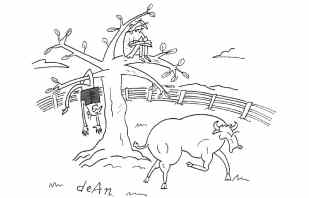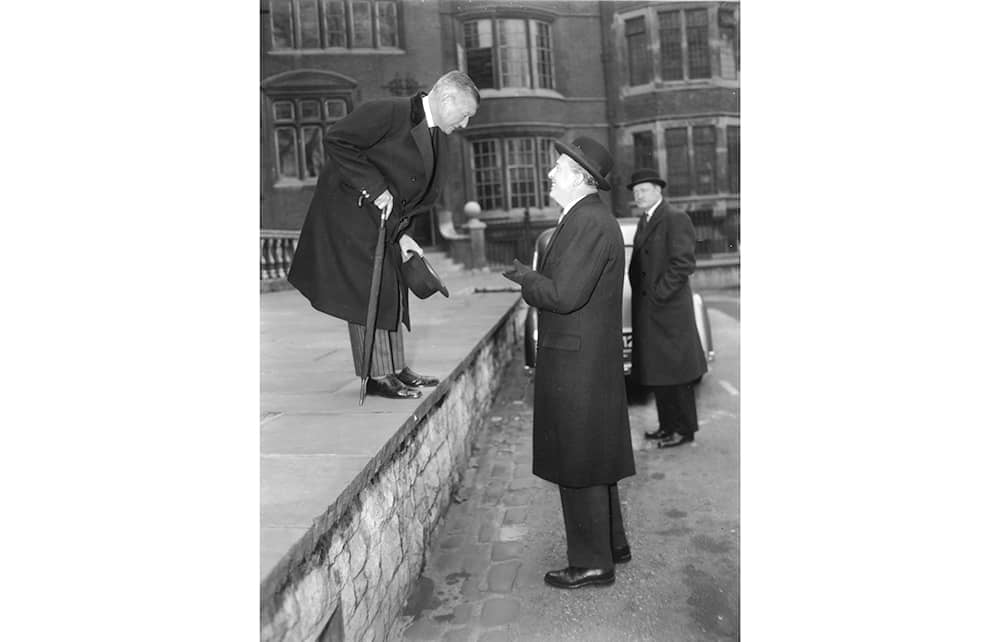‘Why was he born so beautiful, why was he born at all?’ When ‘Chips’ Channon strolled into the House of Commons tea room in 1951, this was the chant with which encircling drunken Labour MPs mocked him. Politically, he was inessential they thought, and epicene. He admitted to being the best-dressed of MPs, but reckoned the young socialist Anthony Crosland to be the most beautiful. As a historical record keeper, though, he has cut a deeper and more ineffaceable mark than any of his tormentors.
Nothing compares with the unexpurgated Channon diaries. They are rich, exuberant, copious and shatteringly honest. For those interested in the parliamentary politics of 20th-century England, in the conniving and jostling among European traders of influence, in the swansong of aristocratic glamour in Mayfair and Belgravia, in the capering duplicity necessitated by a criminalised sexuality, the diaries are matchless. Some readers of the two previous volumes have felt indignant at the reflexive racism of his generation. Prigs have tut-tutted at the relentless pleasure-seeking of his set. Despite this squeamish belittling of Channon’s achievement, his shrewd, unsparing self-portrayal makes his life story one of the great ego histories of his century. His editor Simon Heffer, who has been deftly aided by Hugo Vickers, deserves a lifetime award for his strenuous efforts in mastering 3,000 pages of text with such precision and nimble wit.
Channon – a Chicago-born adventurer who was Anglicised by a few terms at Christ Church, Oxford – began his diaries in 1918 as a real-life counterpart to Proust’s voluminous novel A la recherche du temps perdu, which he adulated. After his marriage to a Guinness heiress, acquisition of a vast house in Belgrave Square and election as Conservative MP for Southend in 1935, Trollope’s novels and Charles Greville’s journals became the models for his record of parliamentary intrigue, political score-settling and jobbery.

In this third and final volume of the diaries there are fewer parliamentary scenes. Channon notes Winston Churchill’s fake cordiality, his self-parody and his admiration for the evangelist Billy Graham. He likens the Labour leader Clement Attlee to ‘a little buzzing wasp’ on the front benches, ‘maddening, prim, self-righteous’. He enjoys his former patron ‘Rab’ Butler trouncing the socialist Aneurin Bevan in debate, and backs Butler to succeed ‘weak, vacillating, silly’ Anthony Eden as prime minister. Edward Heath impresses him as a masterly chief whip. Harold Macmillan’s replacement of Eden as prime minister and fetching pose as a languid Edwardian gives him hope.
Like Macmillan, Channon sees public life as a performance. Aspiring parliamentarians must act up, even prance and pose flamboyantly, to achieve political fame. ‘No man who wasn’t at least a touch [homosexual] would ever stand for parliament,’ one Conservative frontbencher tells him in 1947. Four years later Channon describes Eden drinking chartreuse in the smoking room of the Commons: ‘“Chips dear” “Chips darling!” etc interlarded his desultory conversation.’ He also sees womanish streaks in Patrick Buchan-Hepburn, Heath’s predecessor as chief whip, calling him ‘a bitch du premier ordre’ and ‘a governess’. The superabundant testosterone in another whip, Walter Bromley-Davenport, ends his career after he kicks a rebel Tory MP down a staircase, only to discover that he has assaulted the Belgian ambassador.
‘We were bejewelled, scented and wore deep red carnations. We must have looked liked popinjays!’
Channon never hides his ostentation, his snobbery, his boastfulness rooted in insecurity, his jealous spite and his intolerance of inferiority. But he enjoys making his friends happy, and exercising his historic sense, and showing his unflagging generosity of spirit. His tenderness towards his adored only child, Paul, is a delight. Speaking from self-knowledge, he accuses Lord Rothermere of ‘all the hardness and obstinacy of the indolent’. He advocates public hangings of murderers as a deterrent to crime. Most people, he thinks, are submissive masochists who become reliable and devoted if snubbed.
His Siamese cat resembles Vivien Leigh. Hollywood stars, such as Mae West and Danny Kaye, add cachet to his parties. He puts amphetamines in the drinks to make his guests whizz. He enjoys matins téléphoniques, during which he does nothing but make and receive intriguing calls about parliamentary plots, sexual gossip and party-giving. He deplores drinks being served in a room with undrawn curtains, hates Renoirs and dislikes marquises. His favourite book is Harold Acton’s account of dynastic decadence and lethargy, The Bourbons of Naples. He is a devotee of colonic irrigation (‘all sorts of things came out!’).
The wartime breakdown of Channon’s marriage liberated him. He fell in love with a pretty youth called Peter Coats, who became the love of his life. ‘He is my all,’ he wrote after 17 years with Coats. ‘He soothes, simplifies and colours my whole existence. He is an angel, an inspired golden creature endowed with every grace and charm.’ Although both men were possessive, neither of them found it helpful to be sexually exclusive.
The dramatist Terence Rattigan was second in significance only to Coats among Channon’s lovers. His play The Deep Blue Sea is based on their love triangles. Noël Coward said that Channon had been the making of Rattigan: the two men, he added, had ‘one of the romances of the century’; and at one time the dramatist wished that he could marry the MP. One evening in 1946 the pair accompanied John Gielgud and his boyfriend Craig Williams, ‘an American nouveauté from Sheboygan, Wisconsin’, to see the famous production, with Cecil Beaton’s designs, of Lady Windermere’s Fan. ‘We were conspicuous, we four, as we were bejewelled, scented and wore deep red carnations – indeed we must have looked like popinjays!’
The Belgrave Square house is disrupted after Channon makes room in it for the alcoholic Labour MP Raymond Blackburn, who had a wife and children in Beckenham. ‘He has magic for me and I love him,’ Channon confides to his diary. One morning Blackburn, ‘naked and unashamed, dynamic and amusing,’ materialises in Channon’s bedroom. On another occasion, after a binge with Churchill, Blackburn crawls into his landlord’s bed. Their friendship cools after Blackburn brings a woman to the house and beds her in the Louis XIV chambre. Blackburn was later imprisoned for fraud, and became a pesky anti-pornography campaigner.
One night in 1948 Channon goes to Wapping in search of rough trade, ‘but somehow it didn’t come off’. In 1951 he is introduced (probably by the interior decorator Kenneth Villiers) to Douglas Furr, a darkly handsome corporal in the Life Guards, who becomes his ‘private friend’. Chips mistakes him for a cockney (in fact Furr’s father was a prosperous Hertfordshire fishmonger who had once played professional soccer for Manchester City) and delights in his ‘cheery companionship’, his racy talk and his ‘refreshing’ ordinariness. ‘I long, at times deeply, for a common way of life; common problems, shirtsleeves, sweating companions,’ he writes after a ‘rewarding’ bout with Furr. They meet to mutual advantage for some years, until in 1955 Furr marries a woman called Brenda.
Another private friend is the auburn-haired Nigel Davies, who was elected Conservative MP for Epping in his twenties. He takes this ‘charming, gay, eager’ acolyte to meet the Duchess of Windsor in Paris, and the Duchess of Kent at Ascot. Later, after an evening again arranged by Villiers, Channon has a foursome with Davies, Rattigan and Lord Montagu of Beaulieu, whom he describes as the prettiest peer in England. He notes afterwards that Davies, although ‘Veronese-looking’, has ‘sores in unexpected places’, while Edward Montagu is ‘unexpectedly hirsute’. On another occasion, after ‘an amazing connection’ with Davies, the ‘insinuating, gentle… exquisite’ youngster boasts of a recent frolic with ‘sexually ambidextrous’ Selwyn Lloyd, the future foreign secretary and speaker of the House of Commons, just a few days before Lloyd married his secretary.
Do MPs still have same-sex and sometimes cross-party one-night-stands with one another? I fear not.






Comments